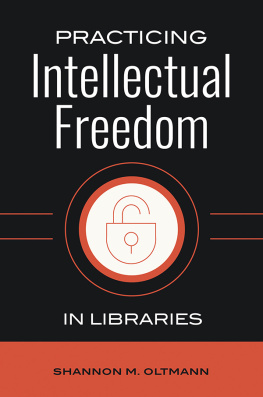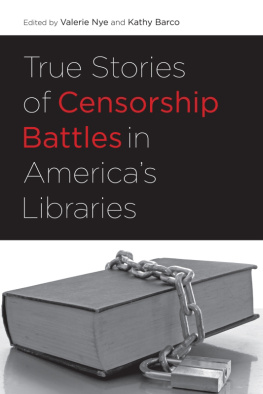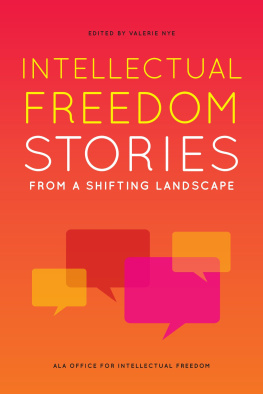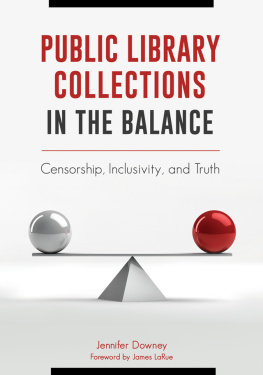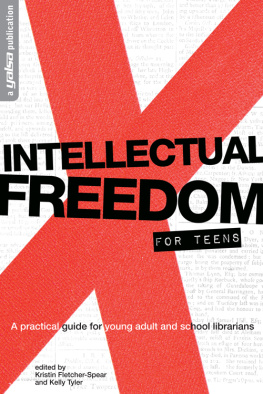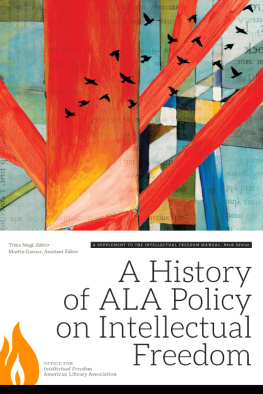Practicing Intellectual Freedom in Libraries
Practicing Intellectual Freedom in Libraries
Shannon M. Oltmann

Copyright 2019 by Shannon M. Oltmann
All rights reserved. No part of this publication may be reproduced, stored in a retrieval system, or transmitted, in any form or by any means, electronic, mechanical, photocopying, recording, or otherwise, except for the inclusion of brief quotations in a review, without prior permission in writing from the publisher.
Library of Congress Cataloging in Publication Control Number: 2019021551
ISBN: 978-1-4408-6312-7 (paperback)
978-1-4408-6313-4 (ebook)
232221201912345
This book is also available as an eBook.
Libraries Unlimited
An Imprint of ABC-CLIO, LLC
ABC-CLIO, LLC
147 Castilian Drive
Santa Barbara, California 93117
www.abc-clio.com
This book is printed on acid-free paper 
Manufactured in the United States of America
This book is dedicated to my lovely wife, Beth, who helped me believe in myself.
Contents
Many people helped with the development of Practicing Intellectual Freedom in Libraries. First, I want to thank my wife, Beth, whose steadfast belief in me carried me through times of doubt and writers block. Her willingness and ability to sit down and plan out the work (over and over again) were incredibly helpful and productive. My family, especially my parents, Melody and Duane, have also always believed in me and encouraged me to stretch my wings. Danya, Mike, and Tony provided support and cheered me on. Jack and Nancy Bair provided enthusiastic support and let me spend many weekends working away at their table. Our dog Oliver was a constant companion and steadfast assistant editor, often napping next to my desk while I worked.
Daniel Callison was the first to suggest I write for Libraries Unlimited (LU), where Jessica Gribble has been a stalwart and supportive editor, helping me fine-tune the book. Emma Bailey at LU and Mary Jo Bolduc at the American Library Association helped ensure that I had the appropriate permissions for quoted passages.
Many friends and colleagues have played a role in the development of these ideas and in the writing process. Since we first found ourselves standing next to each other at a poster session, Emily J.M. Knox and I have collaborated several times; each exchange sharpens my grasp of these concepts and how to apply them. I held semiregular working meetings with Lois Scheidt, who seemed confident that I would be able to finish what seemed, at times, a monumental task. Stacy Kowalczyk always had words of wisdom and encouragement. Friends near and far connected with me via social media to root for the book.
At the University of Kentucky, Ive been fortunate to have great colleagues. Several of us women met semiregularly for a writing group, spending a few hours a week together in the university library or at nearby coffee shops. The camaraderie of this group helped sustain me. Colleagues at the School of Information Science and the College of Communication and Information were supportive and celebrated milestones with me. My director, Jeffrey T. Huber, was also helpful along this process. Finally, I cant forget to mention Starbucks #2561, my neighborhood store and my home for writing much of this book. Apologies to anyone Ive left out!
Intellectual freedom is one of the core values of librarianship and a foundational principle for the profession. It has been enshrined as an important concept since the creation of the Library Bill of Rights in 1939 (American Library Association [ALA], 2006b). This book explores intellectual freedom from many angles and perspectives, enabling us to have a deeper appreciation of the principle and a firmer grasp on how to apply it in our daily librarianship.
In this introduction, well explore the definition of intellectual freedom and the importance of practicing intellectual freedom skills. Well also provide a brief synopsis of each chapter in the rest of the book.
Defining Intellectual Freedom
What do we mean by intellectual freedom? We need to start with the foundational definition. The ALA has defined intellectual freedom as
the right of every individual to both seek and receive information from all points of view without restriction. [Intellectual freedom] provides for free access to all expressions of ideas through which any and all sides of a question, cause or movement may be explored. (ALA, 2007, para. 1)
Intellectual freedom is often seen as an opposition to censorship; while censorship tries to restrict access to some information, intellectual freedom advocates for open access to information. Lets examine the first sentence of this definition in detail.
Breaking down the Definition
Though ALAs definition may seem simple, it has several important components that deserve closer scrutiny. The first part is the right From the first words, the ALA is arguing that intellectual freedom is a right that people have. It is not a frivolous luxury, but something that people deserve to have. We will see, throughout this book, how intellectual freedom is connected to the right to freedom of speech, enshrined in the First Amendment of the U.S. Constitution. This means that intellectual freedom is, in fact, a right.
Next, we can see that this right is for every individual This, again, is quite broad. Intellectual freedom is not limited to library patrons, to those who can prove citizenship, to those with the ability to pay for access, to those with the most need for certain information, or any other sort of restriction. On the contrary, intellectual freedom is for every individual, regardless of circumstances or need.
Looking at the verbs, we see that intellectual freedom covers the right to both seek and receive information. Seeking is more activeit connotes looking for or questing for something, being in search of particular information. Receiving, on the other hand, is a bit more passive. It can mean that information is made available and the individual takes it in. There are, of course, many ways to make information available, and libraries often do a great job at utilizing multiple means of enabling information access.
The next component of the definition is from all points of view This is a key phrase in the definition of intellectual freedom (as well see in the second part of the book, when we apply the concept of intellectual freedom to various scenarios in libraries).
Simply put, libraries and other information organizations should strive to offer access to as many points of view as possible. This means, for example, having books that convey both the Republican and Democratic perspectivesas well as socialist, libertarian, and other political viewpoints. If Christian music is available to check out or listen to, then secular music should be available too, as well as music with roots in other religious systems.
Finally, another important phrase is without restriction For the ALA, it is important to provide access to all points of view without putting up barriers to any of those viewpoints. A simple anecdote can illustrate the various forms that barriers can take.
At a well-known religious university, some texts about other religions (e.g., Islam and Buddhism) were being kept behind the reference desk. The librarian who shared this anecdote with me said that he wanted to protect the students from potentially harmful information. Unfortunately, his actions resulted in restrictions to information for the students. They had to request access to the books instead of picking them off the shelf; fear of judgment, intimidation, or embarrassment would likely lead some students to not ask for the booksthus, this simple barrier restricted access. Since the books werent on the shelves, they also could not be found through browsing.

